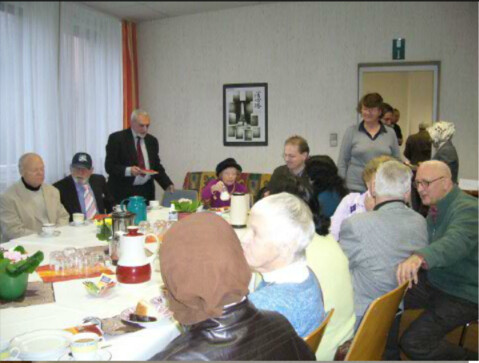Stuttgart, Germany - UPF-Stuttgart organized a forum on Jan. 15, 2011, with the title “Can Islam be called a peaceful religion?” Samir El Midani, a Muslim originally from Egypt, Ambassador for Peace, and former President of the Islamic Federation of Stuttgart, was the main speaker.
Following reports on the massacres of Christian minorities in Egypt and Nigeria, many observers are pondering whether Islam can be called a peaceful religion at all. Reports of persecution and massacres most likely come from nations with a high Muslim population.
The Stuttgart conference was attended by 36 persons, among the 21 Ambassadors for Peace. They were listening to El Midani’s arguments very attentively. El Midani tried to counter widespread prejudices against his religion, Islam. According to his presentation, Islam as a world religion has nothing to do with terrorism. Using verses from the Qur'an, he explained that murder is considered a crime and suicide is forbidden. Force is allowed only for self-defense. The Qur'an explicitly forbids all forms of religious extremism and force in matters of faith. He then tried to explain how the Qur'an propagates a governance of justice and faith in God. Terrorism, whether committed by individuals, groups, or governments, is always politically, never religiously motivated. Only justice will be able to cure violence. Samir El Midani feels that Germany is currently experiencing a rise of Islamophobia and anti-Arabism.
After a coffee break, during which a heated discussion was going on, the presenter was ready to take questions. He was supported by another Ambassador for Peace, Dr. Taher Al-Radwany, originally from Iraq and a Professor of Islamic Studies. Questions revolved around issues of tolerance in faith issues, blood revenge, “honor killings”, the death penalty, and the practice of stoning people to death. El Midani confirmed that all of those practices were actually incompatible with Islam. Another question concerned the willingness of Muslims to engage in dialogue. It was pointed out that they are part of several “religious round-table associations”, most notably in the round table discussions organized by UPF-Stuttgart, as was explained by Hubert Arnoldi, head of the Stuttgart Round Table.
Finall,y three new Ambassadors for Peace were appointed: Dr. Emre Tanay, a Sufi follower with Turkish roots, was one of them. He summarized the whole event with the words: “Once we offer ourselves wholeheartedly to God, then religious belonging or upbringing is no longer important. All religions share the same core.”

